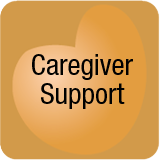Online Support Groups for Caregivers Offers Stress and Crises Relief
 Caregivers and care receivers experience high levels of stress and anxiety that are physically and mentally disabling. Caregivers and care receivers may be isolated, pressured to make decisions in crises, or may not know where to turn for emotional support or practical information.
Caregivers and care receivers experience high levels of stress and anxiety that are physically and mentally disabling. Caregivers and care receivers may be isolated, pressured to make decisions in crises, or may not know where to turn for emotional support or practical information.
Online support groups, online programs, and live online support offer caregivers and care receivers the opportunity to listen, learn to advocate, and share with others in similar situations.
Convenience and access are important. Feelings of overwhelm and anxiety are daily experiences for caregivers and care receivers. Online caregiver support and practical information are available 24 hours a day and 7 days a week through The Caring Generation® library and the family caregiver private Facebook Group, The Caregiving Trap.
Caregivers and care receivers have little downtime for rest or to pursue favorite activities. Providing or needing care for a loved one turns into a full-time job. Daily tasks include running errands, managing medications, attending medical appointments, supervising in-home caregivers, monitoring care community staff, and more. There is a heightened sense of always having to be “on” call or “on” alert for the next unexpected event or task. A feeling of dread occurs every time the phone rings that the news will be bad. A full night of restful and peaceful sleep is rare. 
Caregiving and Care Receiving are Exhausting
I understand the concerns of caregivers and care receivers from being a family caregiver combined with more than 20 years of professional experience as a caregiving advocate. Freedom from responsibility seems like an impossible dream. Relief from stress and anxiety is non-existent. Peace of mind is rare. Many caregivers don’t know how to turn off “worry mode” in their minds.
This is the daily reality of many caregivers and care receivers. Only by creating your own set of tools, tips, and resources will you be able to navigate The Caregiving Trap and advocate for yourself. Advocating for yourself means relieving the stress and anxiety of caregiving and increasing confidence levels to be more proactive.
Caregivers and Care Receivers Feel Trapped
Caregivers and care receivers tell me they feel trapped by daily responsibilities, physical disabilities, health concerns, worries about finances, and feeling that care is a burden. Taking the step to access support can feel like another daunting task. If there are concerns about anonymity, join a private group or sign up to receive a newsletter. You choose the level of participation. This means that you can receive and read information only. You also have the opportunity to ask questions and create supportive relationships.
Evaluate the sites you consider for support to determine if they are filled with advertising from other companies or if the site is managed by a caregiving expert. Some caregivers are hesitant to join websites for fear of ongoing solicitations by advertisers. While caregiving experts may offer their own products for sale you will not likely be approached by other advertisers unless this is disclosed.
On-Line Caregiver Support Groups and Programs Are Easily Accessible
If you live in a small town with limited resources, an online caregiver support group or program offers a connection with others. If you are a caregiver or care receiver with limited free time or limited transportation options, online support gives you the choice of day and time access. You are one step away from advocating for your needs.
Online caregiver programs that offer programming, education, and helpful tips are the most valuable. Expert information saves you time, money, mistakes, and anxiety. Access is as near as a computer and an Internet connection. There’s no need to drive to and from a location to meet in person. Physical attendance may not be practical due to having to obtain a home sitter or challenges with transportation. You can log in online. Check your email for a newsletter, log into your online group to read the latest information, watch a video, or listen to a podcast. Join a webinar to participate in the program of your choice. The possibilities for support are endless.
Expert On-Line Support Groups and Programs are Valuable
The better qualified online support groups and programs are hosted by a caregiving expert who posts information and responds frequently. Some online-support groups simply message boards where questions are entered for the group participants to respond. In these situations, caregivers are offering their personal experiences.
Review whether the site is focused solely on caregiver support or if the site features advertising. The setup of the site may affect your experience. Caregiving programs, much like educational courses, can be purchased and offer advanced information related to specific topics that may not be addressed in online support groups. Tip sheets, lists, and step-by-step information make it easy to resolve common caregiving concerns. Webinars can be watched and watched again. Learning to advocate for yourself as a caregiver or a care receiver is possible and easy by accessing a variety of resources.
Indecision and Lack of Information Prevents Forward Progress and Decision Making
Indecision is the most common reason that caregivers and care receivers fail to make decisions. How many caregivers or care receivers are stalled in making progress because of not knowing what action to take or not feeling confident in having enough information to make a good decision? There are many reasons that we hesitate and feel afraid of making decisions. By understanding these common reasons, we become more confident and able to advocate for loved ones or ourselves.
Lack of access to information or not knowing what specific questions to ask are the most common reasons that caregivers and care receivers make mistakes. Fear of making mistakes halts forward progress and decision-making. Life does not train us to be caregivers just as there is no manual on how to raise children. Many caregivers learn by doing and by investigating. Consulting a caregiving advocate, accessing programming, or joining a support group can save time, money, and effort.
While the Internet can provide too much information, specific support groups targeted to the needs of caregivers and care receivers are of significant value. Live online support groups with an educational component may be the most effective source of information depending on your individual needs. These types of support groups offer information and then have question and answer sessions where members of the group can pose and receive answers to questions in a live setting. The sessions are then saved for later reference for members of the support group.
Advocacy Depends on the Strength of Your Resources
Having the right resources and access to information supports caregivers and care receivers to increase confidence, become better advocates, and receive better than average care. What we don’t know, or the questions we don’t ask is often the difference between a positive outcome or a frustrating outcome. As a caregiver or care receivers, we cannot rely on others to solve problems—decision-making is our responsibility. The most important consideration is that we are experts about ourselves, family members, and others for whom we care. While others can provide recommendations and information, the next step is evaluation of the information and decision-making based on factual information gathering.
Individuals in the health and care industries who provide services may not be the best educators. A primary example is the time pressure during a medical appointment that results in physicians not having the time to thoroughly explain a health diagnosis or medical recommendations. Patients are fortunate to be ushered in and out of a 15-minute appointment.
Being prepared to advocate for yourself is the fastest route to success to ensure you and your loved ones receive the best care. Learning to advocate is a skill that can be learned through caregiving programming, support groups, collaborating with other caregivers, and working with caregiving experts. The resources offered on my website support caregivers and care receivers.
© 2018 Pamela D. Wilson, All Rights Reserved.



